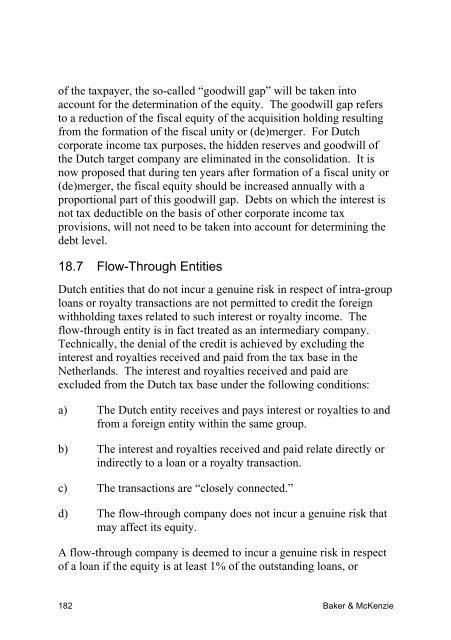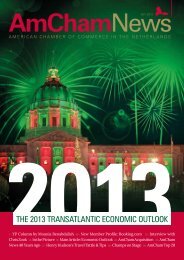Doing Business in the Netherlands 2012 - American Chamber of ...
Doing Business in the Netherlands 2012 - American Chamber of ...
Doing Business in the Netherlands 2012 - American Chamber of ...
Create successful ePaper yourself
Turn your PDF publications into a flip-book with our unique Google optimized e-Paper software.
<strong>of</strong> <strong>the</strong> taxpayer, <strong>the</strong> so-called “goodwill gap” will be taken <strong>in</strong>to<br />
account for <strong>the</strong> determ<strong>in</strong>ation <strong>of</strong> <strong>the</strong> equity. The goodwill gap refers<br />
to a reduction <strong>of</strong> <strong>the</strong> fiscal equity <strong>of</strong> <strong>the</strong> acquisition hold<strong>in</strong>g result<strong>in</strong>g<br />
from <strong>the</strong> formation <strong>of</strong> <strong>the</strong> fiscal unity or (de)merger. For Dutch<br />
corporate <strong>in</strong>come tax purposes, <strong>the</strong> hidden reserves and goodwill <strong>of</strong><br />
<strong>the</strong> Dutch target company are elim<strong>in</strong>ated <strong>in</strong> <strong>the</strong> consolidation. It is<br />
now proposed that dur<strong>in</strong>g ten years after formation <strong>of</strong> a fiscal unity or<br />
(de)merger, <strong>the</strong> fiscal equity should be <strong>in</strong>creased annually with a<br />
proportional part <strong>of</strong> this goodwill gap. Debts on which <strong>the</strong> <strong>in</strong>terest is<br />
not tax deductible on <strong>the</strong> basis <strong>of</strong> o<strong>the</strong>r corporate <strong>in</strong>come tax<br />
provisions, will not need to be taken <strong>in</strong>to account for determ<strong>in</strong><strong>in</strong>g <strong>the</strong><br />
debt level.<br />
18.7 Flow-Through Entities<br />
Dutch entities that do not <strong>in</strong>cur a genu<strong>in</strong>e risk <strong>in</strong> respect <strong>of</strong> <strong>in</strong>tra-group<br />
loans or royalty transactions are not permitted to credit <strong>the</strong> foreign<br />
withhold<strong>in</strong>g taxes related to such <strong>in</strong>terest or royalty <strong>in</strong>come. The<br />
flow-through entity is <strong>in</strong> fact treated as an <strong>in</strong>termediary company.<br />
Technically, <strong>the</strong> denial <strong>of</strong> <strong>the</strong> credit is achieved by exclud<strong>in</strong>g <strong>the</strong><br />
<strong>in</strong>terest and royalties received and paid from <strong>the</strong> tax base <strong>in</strong> <strong>the</strong><br />
Ne<strong>the</strong>rlands. The <strong>in</strong>terest and royalties received and paid are<br />
excluded from <strong>the</strong> Dutch tax base under <strong>the</strong> follow<strong>in</strong>g conditions:<br />
a) The Dutch entity receives and pays <strong>in</strong>terest or royalties to and<br />
from a foreign entity with<strong>in</strong> <strong>the</strong> same group.<br />
b) The <strong>in</strong>terest and royalties received and paid relate directly or<br />
<strong>in</strong>directly to a loan or a royalty transaction.<br />
c) The transactions are “closely connected.”<br />
d) The flow-through company does not <strong>in</strong>cur a genu<strong>in</strong>e risk that<br />
may affect its equity.<br />
A flow-through company is deemed to <strong>in</strong>cur a genu<strong>in</strong>e risk <strong>in</strong> respect<br />
<strong>of</strong> a loan if <strong>the</strong> equity is at least 1% <strong>of</strong> <strong>the</strong> outstand<strong>in</strong>g loans, or<br />
182 Baker & McKenzie





![912.025 AmCham News [1] - American Chamber of Commerce in ...](https://img.yumpu.com/9328612/1/190x127/912025-amcham-news-1-american-chamber-of-commerce-in-.jpg?quality=85)

